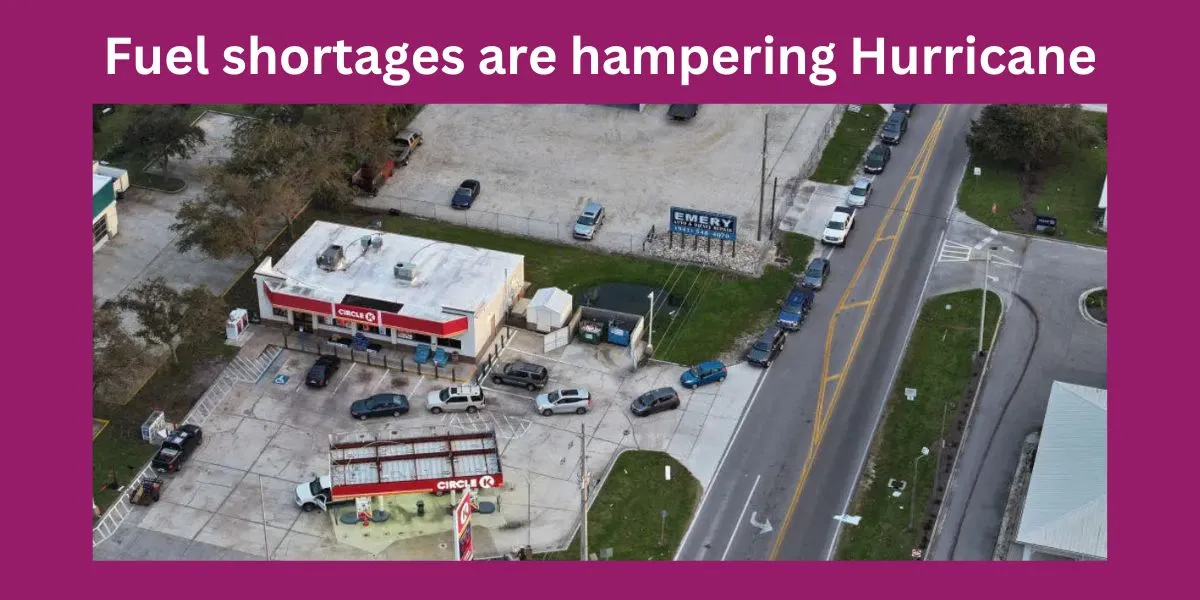Hurricane season is an unpredictable and often devastating time of year. People living in coastal areas know all too well the importance of preparing for the worst. But there’s something that’s proving just as destructive as the hurricanes themselves—fuel shortages. When a natural disaster hits, fuel becomes as precious as water, but what happens when there just isn’t enough? That’s exactly what’s been happening lately, and it’s causing big problems for relief efforts.
The Growing Impact of Fuel Shortages on Hurricane Relief
Fuel shortages are no small issue, especially when it comes to hurricane relief. When a storm hits, fuel is needed for everything from evacuation vehicles to emergency generators. Without it, rescuers can’t get to the people who need help, and communities can’t recover from the aftermath as quickly. The scarcity of fuel isn’t just a minor inconvenience; it’s making it harder for everyone involved.
Why is Fuel So Important During a Hurricane?
Imagine trying to drive your family to safety with no gas in the car. That’s a reality for many when fuel runs out. Hurricanes cause widespread power outages, and generators, which run on fuel, become lifelines for hospitals, shelters, and homes. Emergency vehicles like ambulances, fire trucks, and rescue boats all need fuel to operate. Without it, disaster management grinds to a halt.
Fuel Is a Matter of Life and Death
It’s no exaggeration to say that fuel shortages can mean the difference between life and death during a hurricane. For people relying on oxygen tanks or dialysis machines, power from fuel-driven generators is critical. When the fuel supply chain breaks down, those in need of medical care are left vulnerable.
The Domino Effect: Why Fuel Shortages Make Everything Worse
If fuel runs out, it doesn’t just stop cars and trucks. The ripple effect can be felt throughout the entire community. Here’s what happens:
- Roads get blocked: Without fuel, debris removal and road-clearing operations slow down, leaving roads impassable.
- Supplies can’t be delivered: Food, water, and medical supplies can’t reach the hardest-hit areas.
- Communication falters: Cell towers and emergency communication systems often rely on backup generators, which can fail if they run out of fuel.
In a crisis, when every minute counts, these delays are disastrous.
What’s Causing These Fuel Shortages?
You’re probably wondering why fuel is running out in the first place. It’s not like we don’t have any, right? The truth is, there are several reasons why fuel shortages happen during hurricanes, and they all tend to snowball into one big problem.
Disrupted Supply Chains
One of the biggest reasons for fuel shortages is simple: hurricanes disrupt supply chains. Refineries, pipelines, and fuel depots are often located along the Gulf Coast, which just so happens to be in the path of many hurricanes. When these facilities shut down due to damage or the threat of a storm, fuel stops flowing. And even if there’s fuel available, getting it where it’s needed becomes a logistical nightmare.
Panic Buying and Hoarding
Another contributing factor is panic buying. As soon as a hurricane warning is issued, people rush to gas stations to fill up their tanks, which quickly drains local supplies. It’s a natural reaction, but it only worsens the situation. The result? Empty pumps and frustrated drivers trying to escape the storm.
Limited Transportation
Even when fuel is available at nearby depots, transporting it becomes an issue. Flooded roads, downed power lines, and other storm-related obstacles prevent fuel trucks from reaching gas stations. Without trucks to deliver the fuel, stations can’t replenish their supply, leaving everyone in the dark—literally.
Prioritizing Resources
In the face of a major disaster, authorities have to prioritize where limited resources, like fuel, go. Emergency services, hospitals, and rescue operations take precedence over the general public, which can leave regular citizens scrambling for fuel. This rationing is essential for disaster relief but adds to the frustration of those trying to evacuate or recover.
How Can We Solve the Fuel Shortage Problem?
It’s clear that fuel shortages are a huge issue during hurricanes, but what can be done about it? Fixing the problem isn’t simple, but there are some steps that can help reduce the impact of future shortages.
1. Better Preparedness
One of the best ways to prevent fuel shortages is by improving preparedness. Authorities need to stockpile fuel ahead of hurricane season, especially in areas that are most likely to be hit. Additionally, refineries and pipelines can implement more robust measures to protect their operations during storms.
2. Emergency Fuel Reserves
Just like the Strategic Petroleum Reserve helps protect the U.S. during oil crises, establishing regional emergency fuel reserves could ensure that fuel is available when it’s most needed. These reserves could be strategically located away from hurricane-prone areas to ensure they remain accessible.
3. Diversifying Fuel Sources
Many areas rely heavily on a single fuel source, like gasoline or diesel, but expanding options to include alternative fuels like propane, natural gas, and even renewable energy sources can help alleviate some of the strain on traditional fuel supplies.
4. Improving Logistics
Improving the logistics of fuel delivery can also help minimize shortages. This includes planning for alternative routes and using specialized equipment to reach isolated areas. Coordination between state and federal agencies, as well as private companies, can ensure faster and more efficient distribution during crises.
5. Encouraging Responsible Use
Educating the public about the importance of conserving fuel during an emergency can prevent panic buying and reduce overall demand. Encouraging carpooling, limiting non-essential travel, and sharing resources are small but significant steps that everyone can take to help ease the burden.
What Can You Do if You’re Affected by a Fuel Shortage?
Fuel shortages can leave you feeling powerless, but there are some practical steps you can take to make the situation a little easier.
1. Plan Ahead
The best way to deal with a fuel shortage is to prepare before one happens. Stock up on fuel for generators and vehicles well before hurricane season begins. It’s also a good idea to have backup fuel sources, like propane or solar-powered equipment, in case of an emergency.
2. Stay Informed
During a hurricane, information is your greatest ally. Stay updated on the fuel situation in your area and follow official recommendations. Use social media and community apps to share fuel locations and updates with neighbors.
3. Conserve Fuel
If you’re facing a fuel shortage, make every drop count. Limit unnecessary trips, turn off your car instead of idling, and only use generators when absolutely necessary. This not only helps you but also leaves more fuel available for others who may need it more urgently.
4. Carpool or Share Resources
If you have extra fuel or know of a nearby station with supplies, consider sharing with friends or neighbors. In emergencies, communities often come together, and helping one another can make a world of difference.
5. Use Public Transportation or Evacuation Services
If your vehicle is low on fuel and stations are dry, see if public transportation or evacuation services are available. Many communities offer these services during disasters, and they can be a lifeline when personal vehicles run out of gas.
Conclusion
Fuel shortages during hurricanes are a serious issue that can hamstring relief efforts and put lives at risk. While the causes are complex, solutions like better preparedness, emergency reserves, and improved logistics can help mitigate the problem. For individuals, planning ahead and using fuel responsibly can make a significant difference during a crisis. Remember, it’s not just about getting through the storm—it’s about ensuring that everyone has the resources they need to recover safely.
FAQs
1. Why do fuel shortages occur during hurricanes?
Fuel shortages happen because hurricanes disrupt supply chains, damage refineries, and cause transportation issues. Panic buying and hoarding also contribute to the problem.
2. How can I prepare for a fuel shortage before a hurricane?
You can prepare by stocking up on fuel for your vehicle and generator ahead of time, keeping alternative fuel sources on hand, and staying informed about the fuel supply in your area.
3. What should I do if I run out of fuel during a hurricane?
If you run out of fuel, look for public transportation or evacuation services. You can also conserve fuel by limiting unnecessary travel and sharing resources with your community.
4. How do fuel shortages affect emergency services?
Fuel shortages slow down rescue operations, limit the delivery of supplies, and hinder road-clearing efforts, making it harder for emergency services to help those in need.
5. Can alternative energy sources help during fuel shortages?
Yes, alternative energy sources like propane, natural gas, and solar power can provide backup power and reduce the strain on traditional fuel supplies during emergencies.










